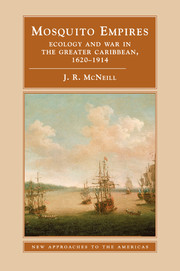Book contents
- Frontmatter
- Contents
- List of Maps
- List of Abbreviations Used in the Footnotes
- Preface
- Acknowledgments
- 1 The Argument (and Its Limits) in Brief
- PART I SETTING THE SCENE
- 2 Atlantic Empires and Caribbean Ecology
- 3 Deadly Fevers, Deadly Doctors
- PART II IMPERIAL MOSQUITOES
- PART III REVOLUTIONARY MOSQUITOES
- Bibliography
- Index
- References
3 - Deadly Fevers, Deadly Doctors
Published online by Cambridge University Press: 05 June 2012
- Frontmatter
- Contents
- List of Maps
- List of Abbreviations Used in the Footnotes
- Preface
- Acknowledgments
- 1 The Argument (and Its Limits) in Brief
- PART I SETTING THE SCENE
- 2 Atlantic Empires and Caribbean Ecology
- 3 Deadly Fevers, Deadly Doctors
- PART II IMPERIAL MOSQUITOES
- PART III REVOLUTIONARY MOSQUITOES
- Bibliography
- Index
- References
Summary
This chapter is about the early history of yellow fever and malaria in the Greater Caribbean and the mainly futile efforts to check or cure these fevers. After 1650, the Greater Caribbean hosted multiple medical traditions from Atlantic Europe, Atlantic Africa, and from indigenous Amerindian society. None of these could help anyone who had contracted yellow fever. One drug, quinine, in the form of powdered bark from the cinchona tree helped against malaria and won wide acceptance. Those most likely to suffer from yellow fever and malaria, newly arrived Europeans, were likely to get what medical attention they received from European doctors, usually to their misfortune. The least unfortunate among fever victims avoided doctors altogether and found themselves in the care of local women, often Afro-Caribbean women, who provided basic nursing. The dismal record of medicine in the face of yellow fever, and to a lesser extent malaria, allowed these two infections to achieve geopolitical importance in the Greater Caribbean for 250 years.
Here I must freely admit that the discussion of medical ideas and practices here is not up to the standards of the historical profession. I have sometimes succumbed to the temptation to reveal my amusement at seventeenth- and eighteenth-century medical writers and practitioners. Many historians, especially historians of medicine, will find this “ahistorical.” They are correct to insist that medical knowledge is anchored in its historical context, that its adherents deserve better than condescending smiles, and that some of the practices we now follow will in 200 years seem laughable.
- Type
- Chapter
- Information
- Mosquito EmpiresEcology and War in the Greater Caribbean, 1620–1914, pp. 63 - 88Publisher: Cambridge University PressPrint publication year: 2010

